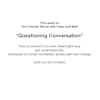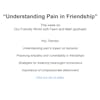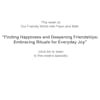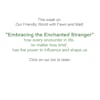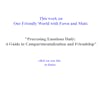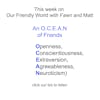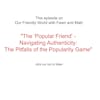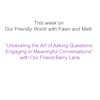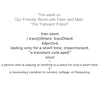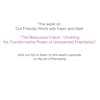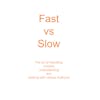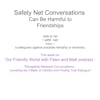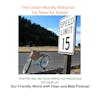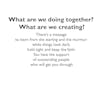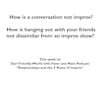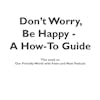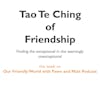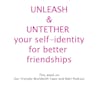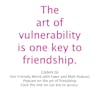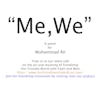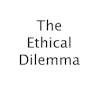
Ethics part 4 "he who cannot draw on 3000 years is living hand to mouth."

Goethe said "he who cannot draw on 3000 years is living hand to mouth." We explore our history and think about this quote by Goethe as we wrap our ethics series. We explore so much, including Goethe, the four ideals, prosperity, the satisfaction of desires, moral duty, spiritual perfection, Lao Tzu, "Tao te Ching," living simply and honestly, the idea of reciprocity and much more.

Goethe said "he who cannot draw on 3000 years is living hand to mouth." We explore our history and think about this quote by Goethe as we wrap our ethics series. We explore so much, including Goethe, the four ideals, prosperity, the satisfaction of desires, moral duty, spiritual perfection, Lao Tzu, "Tao te Ching," living simply and honestly, the idea of reciprocity and much more.
TRANSCRIPT
[00:00:00] Fawn: Yuhoo hello? Hello? Are
[00:00:04] Matt: we ready? Oh my goodness. Yes. So here we are. We're back to talk about ethics. Oh my God. Again, um, we're gonna try to wrap it up though, which, which of course, you know, seeing is how we're literally at, uh, one CE or one common era. Ad for you folks who didn't grow up with it.
There is an awful lot going on. In point of fact, Goethe said "he who cannot draw on 3000 years is living hand to mouth."
[00:00:32] Fawn: Okay. Goethe man or woman,
[00:00:35] Matt: man. German man German. He is the man in German, literature.
[00:00:42] Fawn: I always get a little scared with anything Germans.
[00:00:46] Matt: He does. What's his background. We certainly need to touch a little bit on NCHE today.
So that's gonna be really
scary.
[00:00:51] Fawn: Oh my God. Can we make it a quick one today? We're gonna do what we can do. It's like when you're moving, you're like, okay, we have everything in boxes. And then when it really comes down to it, you're like, oh, wait a minute. There's this piece over here, this piece over there.
And you end up just cramming everything into one final box. Right? And I think that's what we're doing today.
[00:01:11] Matt: oh my goodness.
[00:01:12] Fawn: I mean, ethics is a very complicated thing or situation, isn't it?
[00:01:16] Matt: Well, yeah.
[00:01:17] Fawn: And there's, I mean, we, we should have a whole podcast on just
ethics,
[00:01:22] Matt: right. And ethics is of course that branch of philosophy that's, uh, concerned with what is morally good and bad, right.
And wrong, where they may or may not stand in opposition to each other, sometimes good and evil and right and wrong are in conflict.
[00:01:36] Fawn: Let's get started.
[00:01:37] Matt: Oh my goodness. So when we last left our heroes, as I like to say, we kinda left with the world with, Christianity starting to become ensconced in Rome.
Okay. Not fair because we can certainly go from there and go through all the Western philosophers and talk about ethics of moral right and wrong, but we're completely ignoring what happened over there to the east. So we need to talk about India. Because India gave birth to Hinduism and something that maybe people aren't that aware of, but it also gave birth to, Buddhism.
In India they had this sense that the world was set up in a correct way in a moral way. And the way things were set up was the way things were supposed to be set up. So they looked towards, four ideals and those four ideals would be, prosperity. Hey, we love that one, satisfaction of desires.
They didn't ignore that aspect of ourselves and deny it the way other people did, moral duty and spiritual perfection. And it's that last one that catches you out. So
[00:02:41] Fawn: what are the
four again?
[00:02:43] Matt: Prosperity. Woo, woo. Satisfaction desires. Awesome. Moral duty and spiritual perfection. Mm-hmm . So we start getting into this sense of the wheel of Dharma, the improvement of life
as you go on the, transitioning from perhaps one form to another form. And so all of a sudden, now that takes us out of my life, my specific life on earth and takes me to a more I need to do good things for society because in 300 years, right. I need to, you know, make sure that things are okay,
[00:03:15] Fawn: so you're not myopic, right?
[00:03:17] Matt: Again, you're not living hand to mouth. You're
[00:03:20] Fawn: not tunnel visioned. You're seeing the broader picture.
[00:03:23] Matt: Right? Right now, of course there was backlash. There is always a hedonistic cult. There is
[00:03:29] Fawn: always back backlash. Yeah.
[00:03:31] Matt: There's always people to argue. And, and when you get into Western philosophy, which I encourage everybody to do, there's a lot of back and forth.
And a lot of I refute this, but I accept that. There's a lot of that going on, but anyways, back to India, so they believed that the world was set up the way it should be set up, which led to what now is still existing in India, denial or not the caste system. Where you have priests, you have soldiers and you have kind of the others.
[00:03:58] Fawn: Excuse me. We all have a cast system. There's a definite cast system in the United States. You know, there's a cast system everywhere. I think in society, there's a cast system like it or not
[00:04:10] Matt: spoken like a true Indian,
[00:04:11] Fawn: not, not, not like it or not, but it's, I'm, it's spoken as a realist. Don't tell me there's not a cast system in every country I'm just
around the world.
[00:04:24] Matt: I'm just saying it's not necessarily as let's call it established as it was, is in India. So everything's ordered the way it's ordered and that's how it should always be. Wow. Interesting and great. Certainly if you are a priest or warrior, cuz they're kind of equivalent and warrior cast is also like the ruling is also like the Kings and such.
Not so good if you're in the other cast and they're sub cast to them, but those are the major ones.
[00:04:50] Fawn: I mean studying Greek and Roman history, there was definitely a cast system there.
[00:04:54] Matt: Well, yeah, there were certainly slaves. There were senators and there, there were landowners,
So anyways, so there was a backlash towards the he a hedonistic cult or hedonistic branch. And there was also another schism that went the complete other way. And these are the, oh, I can't pronounce. J a, I N I'll go Jane, but I don't know.
And I'm gonna offend somebody which is still around today. And those are the people that you hear about who are, oh my God, we can't hurt insects. Oh my God, we can't hurt. They actually literally took this sense of moral duty, and spiritual perfection to the point of not harming others. Because that of course is part of your moral duty is not to harm anybody mm-hmm or any.
So that's very interesting. I always
[00:05:38] Fawn: wondered about them because, so you can't eat potatoes, right? Like they're very, very careful why not potatoes? Um, I don't remember, but there was a reason like potato is off. I think, I think I'm talking about the same group, but it's like, what do they eat then? I always think as a vegan, I'm still harming plants.
I totally believe plants have consciousness and feelings and all of that. How do they survive?
[00:06:06] Matt: Right. And it's like, oh, well, okay. Do they drive a car ever? I can, I can, I can only eat like maybe windfall apples, but, uh, is a windfall apple, a potential apple tree. Mm-hmm things start to get real sticky real quick.
Right. Um, and there actually is, there are people who belong to this sect who there's there's, there's like there's two sets of rules, one for one for the priesthood and then one for just regular people. So they don't have to take it to quite the extreme. So I'm willing to bet that, that, you know, people who adhere to that can ride in a train.
They anyways, anyways. And then of course we have Buddhism . And this was a 29 year old prince who one day saw, what is it? an old man, a sick man. A
[00:06:52] Fawn: is this Sidhartha yes. Okay.
[00:06:54] Matt: Yeah. This is the Budha. This is the Budha with capital T capital B. Um, anyways,
the original
one day he saw his parents kept him away from everything.
And one day he saw an old man, a sick man, a man being a, a dead man and a priest well, he decided to become a priest of those four options. That was the one he liked the most, not, he didn't intend it to be a religion. He intended it to be a philosophy and he intended it to be a philosophy where you walk in between, this world of absolute spiritual, it was, he was still of the world and he understood that he would be of the world.
But he practiced self denial and all the rest of it and freedom from desire and all of that and all of that. And that kind of was rejected in India, but China seemed to like it a lot.
China of course, is its own everything. And between Buddhism, you also have another two, legendary figures and that would be Lao Tzu the man who wrote the "Tao te ching,"
which some people only know is a fortune telling system, which is, you know, kind of interesting and bizarre. And then you also have Confucius. Now, Lao Tzu said, Hey, live simple and honest rock on. And he wrote the "Tao te Ching," and everybody draws great meaning from it. I as well, I have a copy and I do refer to it.
I have
[00:08:16] Fawn: a very thick, big copy.
[00:08:18] Matt: But if you wanna distill him down, you kind of distill it down to live simple and honest. And then, if you had to distill, say Confucius down to one, one word, you can actually do it. And that is reciprocity ,kind of the golden rule. You know, what you do to others, you gonna have done to you.
And so he attempted to really define a. Much more, much more rigid where people on top have to help people on the bottom. and then what's very, very interesting is this is one of those instances because they do cast, they both cast such a looming shadow over things. They actually met one another Confucius was very confused by Loa Tzu he didn't understand him at all.
Just spun around in circles.
And of course, Confucius then later had, after he passed then he had different, factions grow up around his philosophy. And one side said that the reason why people are evil is either due to a bad upbringing, so it's the parent's fault, or a lack of education. Then the other, other kind of side said that the rules of morality, keep our baser needs in check.
So that's why we have to have these moralistic rules. I'd love to say gee, that covers it, but my God, there's a lot more going on there, but unfortunately we gotta go back to Rome. And we gotta go back to that. Unfortunately, the Western tradition, which is just gonna drive, Fawn nuts. So we're back there.
Jesus' disciples. Think the end of the world is coming. It doesn't. So what does that mean? Well, all of a sudden, Rome has an empire to run
[00:09:52] Fawn: and you, well, let's rewind. Yes. So they thought the end of the world was coming and. They just gave away all their belongings. They Marie Kondoed everything.
Yes. And then what
[00:10:03] Matt: happened? The end of
[00:10:04] Fawn: the world didn't happen. And then what happened? Because remember in two, in the year, 2000, right before the year, 2000 mm-hmm everyone thought it was the end of the world, then it was 20, 20. Was it 2020? When was it the end of the may calendar? I think
[00:10:19] Matt: it was more like 2012
[00:10:21] Fawn: or 20, 20 12.
That's right. 2012. But. Do people just do bad things. I'm, I'm
[00:10:28] Matt: wondering like people try, honestly, I think more people try and get right than try and get wrong. Hmm. I think, I think it's definitely a rule of more of the moralist versus the hedonist, which is kind of where we sit today, which is kind of the history of philosophy is, is the sense of morals;
is that something that we're taught or something that is inherent to us and what is inherently good, which is exactly what ethics has to talk about. And everybody ping, pongs it back and forth. so we're back in Rome and you've got a whole bunch of Christian soldiers who refuse to fight because killing is wrong.
Yeah. And obviously the auditorial games were wrong and, and slavery, once again is wrong. So what are you gonna do? So you're in power in Rome, but now the Roman emperor has become a Christian. So what do you do? Do you outlaw slavery? Well all the rich landowners are gonna be really upset who have lots of slaves are gonna be really upset.
So it sounds like, or do you piss off the general
[00:11:26] Fawn: population? So I see why you went to that quote because it seems like we are just going in loops. and we
[00:11:32] Matt: do and that over and over again. And that's another thing that somebody else hipped me to, that I need to take a closer look
[00:11:38] Fawn: at. Oh yeah. Our friend mark, you guys mark.
Suddenly one day we were talking, he and this was after Matt and I got into a big fight over how he sees the future versus how I see the future. And I guess I made my point really. It was well pointed out whatever I said. I guess, because you got so depressed and you just said, I give up, I'm exhausted.
Right? There is no refuting what I was saying. Right. And I was talking about women's rights, just everyone's rights that are being trampled on right now.
[00:12:16] Matt: Whereas I saw it as a pendulum, right. And swing one way, and then they swing the other way. And that's kind of how
[00:12:21] Fawn: things go. And, and I was saying, Mmm, no things are really messed up.
And to the point of no
[00:12:27] Matt: return, you were making the argument I actually learned from my systems and simulation computer class, where, when systems generally like to get into harmony, except when they get completely out of whack and you are making the argument that the system getting completely out of
[00:12:44] Fawn: whack.
Right. And, and my argument was, it is so out of whack that it will break and things will be really, really bad. And then you have to start all over again. There are, there is evidence out there with some certain archeologists who have found that every 5,000 years civilization gets completely destroyed. Like mankind goes away, things just break and you have to start all over again.
Anyway. So we had this very depressing talk and fight. And then,
[00:13:19] Matt: and Fawn was right.
[00:13:21] Fawn: Fawn was right. I was rice. Fawn was
[00:13:25] Matt: Fawn was right.
[00:13:26] Fawn: I mean, I really didn't wanna be right. I was trying to, I know, make a point and I was hoping you would counter it like you usually do, but you didn't, you
[00:13:34] Matt: are just gonna hear my same tired, old arguments and you're right.
[00:13:37] Fawn: Yeah. And I was saying, yeah, they are tired. you're gonna hear it. Yeah. So what happened was Mark came in our friend Mark, and he's like, guys, I, I think I figured it out and I feel optimistic about the future. And we're like, oh my God, what? Tell us right now. So we met for coffee and he broke it down for us.
And I really wanna do an episode with Mark, but then Mark wants to make sure that he gets his facts straight before he comes on here. whereas I just like to just like, let's just talk about it. You know what I'm saying? because yeah, it was, it was a little bit uplifting, not a little bit, but a lot uplifting listening to.
And his explanation of basically it was like Aikido and circles and what you just said, right? It just, it comes back around
[00:14:26] Matt: anyways, back to ethics. All right. And now back to our show, so all of a sudden, now you have Christian soldiers or soldiers who convert to Christianity saying I can't go to war. And all of a sudden you have Roman leaders saying, well, if we have a significant population who won't fight.
Well guess what, we're gonna lose this empire and somebody else is gonna carve us up. And everybody, the guy on top always wants to stay on top. Right? So all of a sudden ethics has to become oh, dead, deadly. Ethics has to become flexible and all of a sudden killing in the name of Jesus is okay. Oh my God.
I know. Scary. Absolutely scary. But you see this time and time again, because what are you gonna do? Are you gonna let the other guys steam roll you? Are you not? So we start getting into something that we later dwell on. We under Maia valley, which is kind of the politics of power. What did you say? Maia valley.
Yeah. Oh yeah. Maia valley is the guy way in the, and again, this is one people hate to talk about. That's why we're gonna talk about Machiavelli. We're gonna talk about Nietzsche. Machiavelli was all about if you're in power, how you gonna stay
[00:15:37] Fawn: there? Was he a dictator? I don't know anything about Machiavell. Well, some
[00:15:42] Matt: people say maybe the prince was, meant sarcastically, but people took it to heart.
Because if you are in charge, your problems are different than if you're not in charge. Right. And it's, you start making all sorts of moral decisions about what you do, right? Mm-hmm you start saying, well, is it okay to let 10,000 people starve if a hundred thousand people don't starve. How do you make these decisions?
Utilitarianism is, an offshoot of that, which is greatest, good, greatest number, welcome Star Trek fans. It's tricky. So all of a sudden Christianity had to get more kind of okay with these weird moral dilemmas and all of a sudden, you know, for, uh, religious figures to say, Yes. It's better to kill than, you know, in the name of, because we're right.
Because, because, because, and, you know, you start to see, philosophical issues kind of get. Maybe trampled on maybe tramped on's the right word. And again, slavery, because Christianity believed that yeah. Slaves were just as saveable as anybody else. So
[00:16:51] Fawn: basically we're getting away from true. Well, ethics can mean anything.
Ethics doesn't mean good. So we're getting away from do no harm. Because you wanna make a buck or you wanna be in power and you know what? You can justify any movement you make and make it right with yourself, for yourself to like keep going. So like when you have a friend and your friend acts horribly and starts saying messed up things to you and the friendship breaks.
When the friendship breaks up, they have their own moral justification and they talk to other people about it and like explain their point of view. Or like, even to themselves say why they broke up their friendship. You can make whatever justifications you want. You still did wrong. But if you don't wanna look at that, you know, you just justify until in your head, you brainwash yourself into thinking you did no harm. So all this stuff that's happening again, I think it is just a bunch of the, the patriarchy, basically like men thinking this is the way to go and it's not. There's. So, like I said, in the previous show, I just think there are other possibilities and.
Looking at history right now and saying, this is justified. This is in, you know, in the name of we're doing this. Even if it's in the name of feeding the whole world, it's just basically you have to come to the very, very simple truth of something and don't make excuses. If you have to make excuses. To me, that is wrong.
There's something wrong. If you're having to justify something it's wrong and you know, it's wrong, that's why you're sitting there trying to justify it and put a name on it in the name of,
[00:18:52] Matt: but then what's the difference between trying to justify it and just trying to explain it, or am I, am I going down the apologia or route you are
[00:19:01] Fawn: going down the aplologia or right, because of the apologia or route, because if you're having to explain it, if you're having to justify.
Something is a skew. If something is totally good, there's no explaining. There's no nothing. So if you
[00:19:19] Matt: back to me and say, how could you steal that loaf of bread? I shouldn't say anything. Or should I say it was to feed my family?
[00:19:27] Fawn: Well, that's because I asked you, but if you're gonna say I had to do this to feed my family, you know, it was wrong.
That's you're just, you're justifying it, right. I'm not saying it wasn't. I'm not, I'm not judging, but it's like, I think it comes down to judging yourself. And I think that's a number one issue. And another number one issue is
it's about not even thinking about how you are affecting others. That's another issue. So either you're making excuses or you're so such a psychopath that you're not even thinking of others.
[00:20:07] Matt: And sometimes that's absolutely true. I, I have a hard time arguing that fact,
[00:20:13] Fawn: but that's, that's a whole other issue, right?
There is, there's a problem right there, right? Because obviously something is wrong if you're not able to have empathy and compassion and see someone else's perspective. That's a whole other disease, I think. And I think that's someone who does not belong in the tribe let alone lead
[00:20:34] Matt: a tribe, right. Where a tribe is, uh, just a complete mix of people, because I would say that, you know, in this modern day world where I can theoretically, you know, and let's talk, let's.
You know, modern day 2019 world. Let's not talk about now, cuz I don't know where things are now with the apple cart, but in the 2019 world, I could jump in my car, go to work, talk with a bunch of people who have similar education, similar backgrounds, similar socioeconomic, et cetera, et cetera, et cetera.
And believe I am connecting with my tribe and hearing their argument and making them my own that doesn't take into account everybody else. Mm-hmm because, you know, I'm, I might be working in a privileged position or I might be working in a completely unprivileged position, but I don't necessarily get contact on the other side of it.
Right. You know, to get a true sense to right. Get connection to that aspect of humanity. Mm-hmm because
[00:21:32] Fawn: you're in your bubble.
[00:21:33] Matt: Yeah. And, and that's really the trick. That's really the, I think the hard part about it all. How do you break out of the bubble? How do you, how do you connect with people who aren't just like you particularly, and again now in the internet age where I can literally find, you know, a group of people who maybe went to the same school work at the same company, the whole kit and caboodle who are exactly like me, I can find groups of these people.
We could ignore the rest of the world. I would
[00:22:07] Fawn: say, don't go seeking a group. I would say, go back to a clear slate and be nothing and just watch the world and, and taste all the flavors.
[00:22:19] Matt: And, and that's just it.
[00:22:21] Fawn: And be open without having to profess what you are about and without having to profess what you think all of that. Be a clear slate and see nature as it is. And by that, I mean, not only looking at the trees and the birds and everything, but going out and just like seeing how people speak and how people walk and how people live, how people cook, how people create and just watch like your, like I always say, when you wanna be a good friend, you have to almost treat it like you're watching a movie and don't put anything on it, just watch it and see how it's evolving, how it's transpiring. Right. So I would say the same thing with the whole ethics and joining groups and everything. It's like, don't, don't be such a joiner, just like be open, you know, without judgment.
Just, just watch and listen. You don't have to prove your point all the time. The most important thing is to prove it to yourself and think it to yourself, but like, why are you propagating? Whatever you think is right. Like why? Just be quiet
[00:23:38] Matt: and again,
[00:23:39] Fawn: unless, unless someone needs help, you're gonna let me talk.
all right.
[00:23:44] Matt: Go my
[00:23:45] Fawn: goodness. Sorry. The woman has an opinion.
Dang. I'm kidding. Go ahead.
[00:23:52] Matt: Dang. Ouch.
No, anyways, no, I, I completely agree. It's like figuring out how you can free yourself from judgment, which is a, a real thought one for me personally, by the way. Uh, however, I do try and maintain a sense of curiosity.
I wanna know why. I'm curious as to why I'm not trying to needle in my point, I'm trying to understand. And one of my favorite things is when somebody takes an assumption I have and spins it upside down and forces, most people don't like that forces me to take a completely different
look at the world.
[00:24:25] Fawn: Yeah. We were talking about this yesterday. Why do people get upset with you when you say I'm moving? It's because you're disrupting the pattern that they're used to. And it comes with everything, right? Like they, they have figured out how to go about their lives. They depend on seeing you, or they depend on knowing that you're gonna be there.
Do you know what I'm saying? And
[00:24:47] Matt: yes, but it, I think it's it's, to me, there's a second point to it. There, there is that selfish, complete selfish aspect to it. And then there's also this aspect of the way I live is best and people like feeling that way. Again, it's the same way that people believe that they always act in the most moral way possible, most moral, not necessarily moral way, but the most moral.
So you leaving, people can view that as a rejection of the things that they like or hold onto. Like why would you ever want to leave the most fantastic place on earth? The most cetera, cetera, cetera, you are basically, people can feel like you are rejecting them.
[00:25:32] Fawn: Yeah. We talked about this. Remember when we were talking about, we don't have mentors anymore and we brought it back to like generations and
parents get so offended, especially like as immigrants, immigrant parents get offended when you start becoming more of the culture that you moved into, than your parents did, it's a threat to them right of their existence and everything that they're about. But it comes not just with immigrants, but just parents in general, like generation to the next generation, especially these days.
It's like, they feel rejected. They feel like you're saying your way is wrong. Whereas it's just the transformation of life,
[00:26:20] Matt: right? Absolutely. Or the evolution of your own personal beliefs. And we see something similar in philosophy. So we see people refuting and typically it comes right back to the Greeks versus the Christians, at least in Western thought where the Greeks believed in, uh, worldly success and the Christians quote, unquote Christians. And this is also Judaeo-Christian by the way, they emphasized meekness and obedience and patience. And, and the Greeks didn't do that. We talked about this last show and we go back and forth because, you know, you look at, um, something like, St.
Augustine, and he believed that. Again, meekness. And then, you know, boom, you go to somebody like an Occam who believes that whatever God does is good. And that's a scary thought and philosophy, and I'm getting there to Machiavelli who says G stay in power baby, because you're gonna help out the most people by doing that, even though he didn't really talk about a moral imperative, he only talked about staying in control.
Doing whatever it took to stay in control. So if that meant being a good guy, be a good guy. If that meant not being a good guy, don't be a good guy. Scary. And that takes us zing, zing, zing, Hobbs, the ultimate hedonist who believed that I'll do whatever I want to do. Because it makes me feel good and people come back to that saying, but then why help out poor people?
And he says, well, cuz I, I like the smile on the poor person's face when I give him cash. He skirts the issue though. And he avoids any kind of overarching moral imperative. And that takes us to marks who says the government should enforce equality. And then finally to Nietzsche who allowed the justification of the Nazis, I, which is a scary world. And that's where we always go in ethics is we look at the Nazis as the inherent evil cuz they were, are whatever you want to call it. And Nietzsche gave birth to that. And he said, God is dead. And he was definitely more of the Greek tradition of, if you've got it, flaunt, baby.
And the, these two forces are at war today and it's very, very challenging. The mixed messages, that you'll see, from the media, from everything else, which way you wanna swing. And , it's hard. It's hard to justify back and forth. Like, you know, if you make 10 gajillion dollars, why shouldn't you show off?
I get it. I totally get it.
This is where I'm hoping you'll come back
[00:28:53] Fawn: with something. Well, I don't wanna say anything because you're like, oh, there you go talking again, because, you know, I tend to like, just when a golfer has millions and millions of dollars. Yes. And they're obviously doing some event where they get paid another 700 million from an entity that hurts
hurts people. Mm-hmm that is very vindictive and very, violent. Right, right. Mm-hmm do you know what I'm referring to right now? What's happening these days? I think so.
It's the same thing over and over again. They can justify, well, if I, what, whatever reasons they have for. You already have enough money? Why are you doing this? Why are you obviously playing or working for people that are so obviously against human rights. Right. But they have their own justifications.
Right. And in their own head they can make it okay.
[00:29:55] Matt: Yep. And we are remarkably adaptable creatures in that regard. We are absolutely remarkable creatures. And I guess
[00:30:03] Fawn: this is where it comes in. People are like, well, this is what makes people resent the very wealthy, because you, your decisions are so highlighted on such an extreme where you can say money is evil.
You see that and you, people don't wanna be successful because they think this is the prime example of the root of evil's money. Right. But I think the root of no money is evil and, and wait, no, wait, did I say that right? Do you know what I'm saying? It, it, wait, I didn't say that. Right. I think
[00:30:39] Matt: if you have way too much and you don't have any that in both cases, that's not, that's not a good
[00:30:44] Fawn: thing.
I don't know. I think way too much is fine.
Why is having way too much? Not okay?
[00:30:51] Matt: I think it depends on what you choose to do with
[00:30:53] Fawn: it. That's what I'm saying. I think it just magnifies your ethical decisions cuz they're on a bigger scale. Right. You know, we also buy gas for our car. Where does that come from? It comes from the same group of people that are paying all these golfers, like all this money for some one event, you know, mm-hmm , but in our little meager way where we're doing the same thing that the golfers are doing that we're saying, whoa, what, why are you, why are you
in business with these people, right? Whereas we are all in business with these people. You can't get away from it, but I can see where the distortion comes in of wanting to just remain poor and remain, not in power because you don't want nothing to do with this, but we're all in it. And so it comes down to do no harm.
Just in your own way, on a daily basis, as much as you can, think, what benefits my fellow human, what benefits my fellow life, the life of all that includes everyone, the plants, everything, the world, because your little decisions are the same as the $700 million decision the golfer is
[00:32:17] Matt: making. I totally get it.
Yeah, absolutely.
[00:32:22] Fawn: And then, and just think all this talk is pretty much BS. If you have to talk about it, there's something wrong.
[00:32:31] Matt: There you go because you're having your own doubts and you want to talk things through in the same way. When I have a problem at work, I, we call it a rubber, rubber duck syndrome, but you, you talk to maybe a rubber duck, or maybe it's another, a person you're working with and you talk through the problem.
And sometimes that helps you come to a, a conclusion about it or a decision about it. Mm-hmm and a solution. It's just the moral imperatives are a lot trickier and it's a lot harder because yeah, there's so much, so many arguments on both sides. As history, 3000 years has taught us. I mean, there's a lot of people spend a lot of time thinking about this stuff and, you know, you can choose to follow a Kant or, you know, a Kierkegaard, or you can know a Kant.
Kant is, uh, was a philosopher. Yes. Oh my God, honey. And there's a
[00:33:15] Fawn: gajillion album. No, I'm just thinking about when I have to transcribe this. K a N T. Thank you for spelling it. Okay.
[00:33:22] Matt: and Kierkegaard. Good luck.
[00:33:25] Fawn: thanks, honey. Yep. Uh, well, I, I had two of something. You were just, oh, nevermind. It's just too much.
Well, okay. Here's what I was gonna say, basically breaking it down, I would say, this applies to all of life. If you have to ask, there's a problem, unless you're a psychopath and none of this, then you better ask. Well, but they don't even do it. You know what I'm saying? I know I'm teasing, but like, for example, remember we would watch that show cheaters.
Oh my God. if you have to, if you have a feeling something's wrong, something is wrong. Right. Just move on, get out. Do you know what I'm saying? Absolutely.
[00:34:15] Matt: And well, yeah, I, I used to say, if you get invited on the Jerry Springer, Just disconnect from whoever invited you on the show and just don't even find out something is wrong.
You're good. , you're good. You don't really need to know cuz it's gonna be, God knows what
[00:34:27] Fawn: and because you do already know there it is. You know, do you know what I'm saying? Yes. And so it's, it's in the same line as saying, if you have to talk about it, if you have to keep justifying something, there's something wrong.
Right. I was talking to Heather, remember we had Heather on our show. Mm-hmm who, uh, is psychic and I called her about something. Like Heather, I don't know. What do you think? She's like, you already know the answer. If you have to ask me there's something wrong with that, hell. Right, right. Like, and she was telling me, like, people come to me about relationships, which to me relates back to cheaters.
Like if you have to ask there's something going on, if everything is great copacetic, there's no asking. There's no talking, you're just living. Right. Right. Absolutely. You're you're enjoying your best life.
[00:35:12] Matt: Absolutely. And there you go. And, and to circle back, absolutely to friendship. I would say don't necessarily embrace the Greek don't necessarily embrace the Judeo christian. It's okay to say I'm I'm good. Is it okay to feel that way? But you know, for God's sake, let's, let's do what we can do to help each other.
Boom. Is that it and maintain curiosity and try and free yourself from judgment. I'm gonna work on that
[00:35:40] Fawn: one too. Matt, you say that almost every episode maintain your curiosity.
[00:35:46] Matt: it's
[00:35:46] Fawn: served me well, it has no, it's true. That's one of the things that made me look at you when you would ask me certain questions or you would notice things about me that most people ignore.
right. You were curious, but you were also educated about it, you were open there was no judgment, it was just pure loving to know this person. And that is such a beautiful quality. And I think that's the key to friendship, right? That's one of the arts right there is using that curiosity for that curiosity, to be allowed to serve as respect and honoring someone or something. And
[00:36:30] Matt: there you
[00:36:31] Fawn: go. Okay. Well, what do you think, are we good for this, for this table? Talk today?
Any, anything else are we done? I'm good. Thank you. Oh my God. You're good. Thank. Oh, thank God. Okay. you're nice. This whole ethics talk is very hard for me because it just makes me nuts. It's it's
[00:36:51] Matt: simple. Just keeping, yes. You, you would think life is simple, but I think eat your rice. Drink your tea while your
[00:36:57] Fawn: clothes.
Yeah. When we make things complicated, it's like, why there's so much to do? Why are we making things complicated? You know, you're doing wrong, you know, something is wrong. It's wrong. Do something about it. love you guys. We'll talk to you in a few days. Once again, our friendly world podcast.com www.ourfriendlyworldpodcast.com.
Please leave us a review out there in the world. You can donate to our show, help things along. You can join our circle of friends and grow a community so we can create a better society through the art of friendship. And all we're asking is just let's connect and let's find ways and let's find discussions, but let's find ways in which we can make our society a friendlier one.
That is our only goal is let's just make things better for everyone from social stuff to economic stuff, to everything. So we can all thrive and be happy. All right, love you guys. Talk to you soon. Be well, bye
bye.
New to Our Friendly World with Fawn and Matt?
Here are some great episodes to start with.















